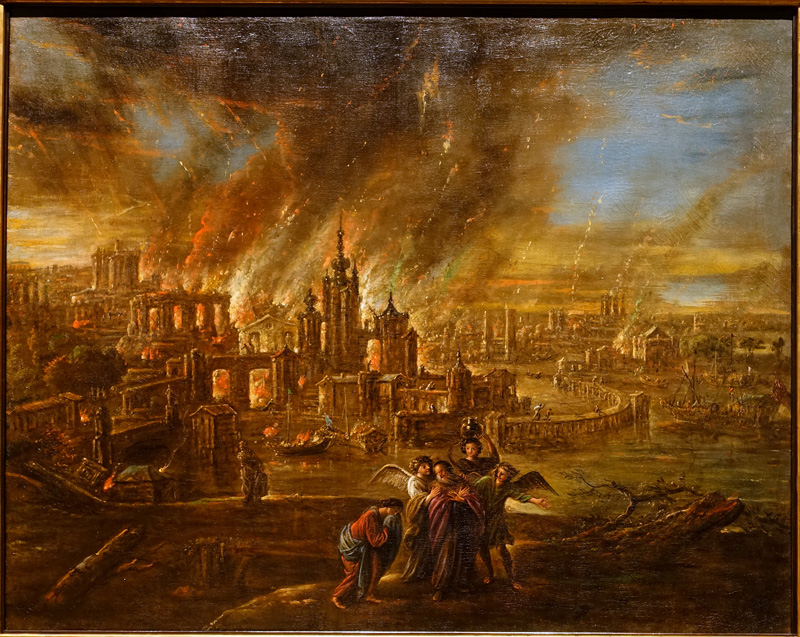As we watch the rising tide of violence sweeping over the world around us, we need to focus on the predictions given in the Bible that allow us to put all of these unsettling events into a prophetic perspective.
The Prediction of Peril
Near the end of His public ministry, Jesus Christ was approached by His disciples asking for His prophetic insight. Matthew 24:36-39 tells us,
“And as he sat upon the mount of Olives, the disciples came unto him privately, saying, Tell us, when shall these things be? and what shall be the sign of thy coming, and of the end of the world?”
Matthew 24:36-3
The Bible tells us that God never leaves His children without light when darkness is coming. In pronouncing the coming judgment upon Israel, the prophet Amos said,
“Surely the Lord GOD will do nothing, but he revealeth his secret unto his servants the prophets.”
Amos 3:7
Jesus first responded to the questions from His disciples by saying,
“Take heed that no man deceive you.”
Matthew 24:4b
He then continued,
“For many shall come in my name, saying, I am Christ; and shall deceive many. And ye shall hear of wars and rumours of wars: see that ye be not troubled: for all [these things] must come to pass, but the end is not yet. For nation shall rise against nation, and kingdom against kingdom: and there shall be famines, and pestilences, and earthquakes, in divers places. All these are the beginning of sorrows.”
Matthew 24:5-8
Jesus begins His summary response with a warning to not be deceived. Deception is a very powerful weapon in warfare. He then tells them of coming false Christs (Messiahs), conflicts and various disasters around the world but that these are just the “beginning of sorrows.”
Then, after giving a frightful overview of key events that will take place as signs of the end, Jesus gives a final prophetic similitude by stating
“But of that day and hour knoweth no man, no, not the angels of heaven, but my Father only. But as the days of Noah were, so shall also the coming of the Son of man be. For as in the days that were before the flood they were eating and drinking, marrying and giving in marriage, until the day that Noah entered into the ark, And knew not until the flood came, and took them all away; so shall also the coming of the Son of man be.”
Matthew 24:36-39
The key to understanding this insight from Jesus is to comprehend the general state of human conduct prior to God’s judgment on the earth.
Violence in the Days of Noah
Before the judgment of God by water, Genesis 6:5-7 tells us the condition of the world before the flood.
“And GOD saw that the wickedness of man [was] great in the earth, and that every imagination of the thoughts of his heart was only evil continually. And it repented the LORD that he had made man on the earth, and it grieved him at his heart. And the LORD said, I will destroy man whom I have created from the face of the earth; both man, and beast, and the creeping thing, and the fowls of the air; for it repenteth me that I have made them.”
Genesis 6:5-7
It sounds a lot like what we are seeing today. The Genesis record continues by telling us in verses 11-13 that,
“The earth also was corrupt before God, and the earth was filled with violence. And God looked upon the earth, and, behold, it was corrupt; for all flesh had corrupted his way upon the earth. And God said unto Noah, The end of all flesh is come before me; for the earth is filled with violence through them; and, behold, I will destroy them with the earth.”
Genesis 6:11-13
Violence after the Garden of Eden
Throughout the history of man, violence seems to be the default condition found among those who are not submissive to the word, will and way of the LORD. Genesis chapter 4 tells us the first violence recorded in the Bible was between two brothers. Cain, whose name means “possession” (which could be a type of those who are ruled by their flesh), rises up against his brother Abel, whose name means “breath” (which could be a type of those who are led by the Spirit). As the contention between the two of them grew, God himself intervenes.
“And the LORD said unto Cain, ‘Why art thou wroth? and why is thy countenance fallen? If thou doest well, shalt thou not be accepted? and if thou doest not well, sin lieth at the door. And unto thee shall be his desire, and thou shalt rule over him.’”
Genesis 4:5-7
Sadly, Cain rejected the counsel of God and rose up and killed his brother.

Violence in the Days of Sodom and Gomorrah
Like the days of Noah, Luke’s gospel tells us:
“Likewise also as it was in the days of Lot; they did eat, they drank, they bought, they sold, they planted, they builded; But the same day that Lot went out of Sodom it rained fire and brimstone from heaven, and destroyed them all. Even thus shall it be in the day when the Son of man is revealed.”
Luke 17:28-30
Before the judgment of God by fire, Genesis 18 tells us:
“the LORD said, Because the cry of Sodom and Gomorrah is great, and because their sin is very grievous; I will go down now, and see whether they have done altogether according to the cry of it, which is come unto me; and if not, I will know.”
Genesis 18:20,21
In chapter 19 we see the angels visiting the city in order to call upon Lot and his family. After retiring to Lot’s house we see:
“But before they lay down, the men of the city, even the men of Sodom, compassed the house round, both old and young, all the people from every quarter: And they called unto Lot, and said unto him, Where are the men which came in to thee this night? bring them out unto us, that we may know them. And Lot went out at the door unto them, and shut the door after him, And said, I pray you, brethren, do not so wickedly. Behold now, I have two daughters which have not known man; let me, I pray you, bring them out unto you, and do ye to them as is good in your eyes: only unto these men do nothing; for therefore came they under the shadow of my roof. And they said, Stand back. And they said again, This one fellow came in to sojourn, and he will needs be a judge: now will we deal worse with thee, than with them. And they pressed sore upon the man, [even] Lot, and came near to break the door.”
Genesis 19:4-9
Clearly, the cities of Sodom and Gomorrah were being ruled by a mob of godless people who only wanted to see their wicked ways fulfilled. Once the righteous were removed from the city, God’s judgment fell.
“Then the LORD rained upon Sodom and upon Gomorrah brimstone and fire from the LORD out of heaven; And he overthrew those cities, and all the plain, and all the inhabitants of the cities, and that which grew upon the ground.”
Genesis 19:24,25

Violence in the Days of the Judges
After Joshua leads the Children of Israel into their promised land, he makes this solemn promise:
“Now therefore fear the LORD, and serve him in sincerity and in truth: and put away the gods which your fathers served on the other side of the flood, and in Egypt; and serve ye the LORD. And if it seem evil unto you to serve the LORD, choose you this day whom ye will serve; whether the gods which your fathers served that [were] on the other side of the flood, or the gods of the Amorites, in whose land ye dwell: but as for me and my house, we will serve the LORD.”
Joshua 24:14,15
Having set the high standard of putting the word, will and way of the LORD first in “his house,” Joshua passes the baton to the subsequent generations that would follow. The Book of Judges records the sad ups and downs of the nation of Israel. After sixteen chapters of repeated regression and rescue, the historic record takes a turn into the dark days of widespread violence in this land of promise. The general state of human conduct during this period is characterized by this straightforward statement.
“In those days there was no king in Israel, but every man did that which was right in his own eyes.”
Judges 17:6
Chapters 17 and 18 records the misdeeds of a Levite whose name is Micah, which means “who is like God.” He steals money from his mother which ends up being made into an idol. Micah sets this idol up in a shrine. The Tribe of Dan comes along and steals the idol. Micah said:
“Ye have taken away my gods which I made, and the priest, and ye are gone away: and what have I more? and what is this that ye say unto me, What aileth thee? And the children of Dan said unto him, Let not thy voice be heard among us, lest angry fellows run upon thee, and thou lose thy life, with the lives of thy household.”
Judges 18:24,25
Again, we see that when the unrighteous rule, the governing motto is “might makes right.”
Finally, we are told in chapters 19-21 of the total moral degradation and depravity of the nation. A man who was seeking his runaway concubine came with her to Gibeah. After finding accommodations, they are surrounded by a demanding mob.
“Now as they were making their hearts merry, behold, the men of the city, certain sons of Belial, beset the house round about, and beat at the door, and spake to the master of the house, the old man, saying, Bring forth the man that came into thine house, that we may know him (carnally).”
Judges 19:22
The subsequent horror and debauchery is incomprehensible. The widespread violence that resulted from this crime almost wiped-out the whole Tribe of Benjamin.
Violence in the End Times
Jesus warned that the conditions of the world in the end would be characterized by violence. Remember His introductory summary of Matthew 24. “For nation shall rise against nation, and kingdom against kingdom…”1 It is interesting to note the Jesus used two terms here to describe the combatants. The first term is “nation” which is from the Greek word ethnos which can mean “ethnic group against ethnic group.” This is a fleshly struggle between people of different heritages and backgrounds.
The second term is “kingdom” which could be a reference to the spiritual conflict between the kingdom of Satan (earthly) and the Kingdom of God (heavenly). This is a war that will culminate with the second coming of Jesus Christ that will ultimately vanquish Satan and his followers.2
Our Refuge in these Days of Rage
Jesus prepared His disciple for this coming conflict by telling them,
“Behold, I send you forth as sheep in the midst of wolves: be ye therefore wise as serpents, and harmless as doves. But beware of men: for they will deliver you up to the councils, and they will scourge you in their synagogues; And ye shall be brought before governors and kings for my sake, for a testimony against them and the Gentiles. But when they deliver you up, take no thought how or what ye shall speak: for it shall be given you in that same hour what ye shall speak. For it is not ye that speak, but the Spirit of your Father which speaketh in you. And the brother shall deliver up the brother to death, and the father the child: and the children shall rise up against [their] parents, and cause them to be put to death. And ye shall be hated of all [men] for my name’s sake: but he that endureth to the end shall be saved. But when they persecute you in this city, flee ye into another: for verily I say unto you, Ye shall not have gone over the cities of Israel, till the Son of man be come. The disciple is not above his master, nor the servant above his lord. It is enough for the disciple that he be as his master, and the servant as his lord. If they have called the master of the house Beelzebub, how much more shall they call them of his household? Fear them not therefore: for there is nothing covered, that shall not be revealed; and hid, that shall not be known. What I tell you in darkness, [that] speak ye in light: and what ye hear in the ear, that preach ye upon the housetops. And fear not them which kill the body, but are not able to kill the soul: but rather fear him which is able to destroy both soul and body in hell.”
Matthew 10:16-28
Therefore, we should not seek to be delivered from the storm that currently surrounds us, but we should seek to stand strong within the eye of the storm knowing that the one who walked on water and calms the sea holds us above the waves and has promised to never leave us nor forsake us.3 Let us remember the “real battle” that we are to fight. Not for our flag and our country but for His kingdom and His glory.
“For though we walk in the flesh, we do not war after the flesh: (For the weapons of our warfare are not carnal, but mighty through God to the pulling down of strong holds;) Casting down imaginations, and every high thing that exalteth itself against the knowledge of God, and bringing into captivity every thought to the obedience of Christ; And having in a readiness to revenge all disobedience, when your obedience is fulfilled.”
2 Corinthians 10:3-6





